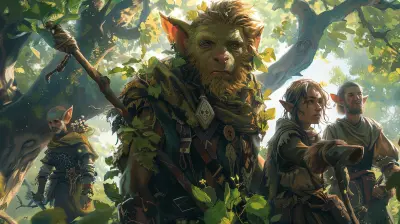Turning Every Subject into a Game-Based Experience
6 October 2025
Let’s be honest—if textbooks were as fun as video games, we’d all have PhDs by now. But don’t worry, I’m not here to bash textbooks (okay, maybe just a little). I’m here to talk about something way cooler—how we can turn every subject under the sun into a game-based experience that doesn't just stick in your brain but also makes learning feel like a side quest instead of a punishment.
So, whether you're a teacher, a parent, or someone stuck in a never-ending loop of online courses, buckle up. We're diving into a pixel-packed world where history has hit points, math has power-ups, and you actually want to pay attention in class.
What the Heck Is a Game-Based Experience Anyway?
Before we go into the nitty-gritty, let’s break down what we mean by “game-based experience.” No, it’s not just turning your homework into a round of Fortnite (although that would be iconic).A game-based experience is when you use game mechanics—think levels, points, rewards, challenges, leaderboards—to enhance learning. It’s not about ditching the subjects, it’s about sneaking in the educational broccoli beneath a layer of cheesy game sauce.
Remember when you were a kid and tried to make eating vegetables more fun by pretending you were a dinosaur chomping down on trees (a.k.a. broccoli)? Game-based learning is kind of like that—but with less raw vegetable and more dopamine.
Why Bother Turning Everything into a Game?
Let me answer your question with another: Have you ever seen a teenager grind for hours to level up in a game but can't sit through a 30-minute math video?Exactly.
Gamification taps into our intrinsic motivation—meaning, we want to keep going. It triggers that little voice in our heads that says, “Just one more quest,” but for something way more productive than unlocking a new skin.
Here’s what game-based learning brings to the table:
- Engagement (because boredom is the final boss of education)
- Motivation (points, badges, and glory, oh my!)
- Retention (you actually remember stuff because you interacted with it)
- Instant feedback (unlike waiting 2 weeks to find out you didn't pass that pop quiz)
Math: From Dreaded Equations to Dragon-Slaying Division
Starting with the most feared and misunderstood subject of them all—math. Poor math, always the villain in everyone’s academic origin story.But what if solving equations was like unlocking treasure chests? Or if algebra was your sword in a battle against numerical monsters?
Leveling Up with Math XP
Instead of writing "10 + 5 = ?" on a worksheet, turn it into a quest: “To cross the bridge and avoid the lava, you must solve the riddle left by the ancient number wizard.” Add some visuals, a timer, and maybe the occasional dramatic soundtrack, and boom—suddenly little Timmy wants to do arithmetic.Plus, platforms like Prodigy are already doing this with RPG-style math games. And they’re wildly popular—because kids would rather go on a math quest for digital pets than stare at a worksheet that looks like it was printed in 1987.
Science: Mix a Potion, Cause an Explosion, Call It Chemistry
Science was made for gameification. It’s already full of experiments, explosions, and wild theories. The only thing missing is a high score.Chemistry Class, Now in RPG Mode
Ever tried to memorize the periodic table? It’s like trying to memorize the cheat code to every game ever made. But what if you could collect elements like Pokémon? “Ah yes, behold—my Level 5 Oxygen! He’s the backbone of my water attack combo.”Or picture this: students crafting digital potions using different atoms. Combine H2 and O? You get water. Combine Na and Cl? Boom—table salt and maybe a +2 Health Boost. Science becomes spell-casting and suddenly everyone’s casting knowledge bombs.
History: Time Travel with a Side of Sabotage
History can be a drag when taught as a never-ending parade of dates and dead people. But add some time machines, assassination plots, and espionage? Now we’re talking.Be the Player, Not the Observer
Games like “Assassin’s Creed” have already proven that people are willing to learn about the Renaissance if it means they get to stab someone in the name of historical accuracy.Imagine a classroom game where you role-play as key figures during the American Revolution. Do you sign the Declaration or betray your fellow patriots? Every decision creates ripples and teaches the cause-effect chain that history books love to preach but forget to make exciting.
Throw in missions, strategic alliances, and moral dilemmas? History becomes a real-time soap opera with better outfits.
Language Arts: Grammar Gladiators and Literary Legends
Diagramming sentences is about as thrilling as watching paint dry… in slow motion… underwater. But what if grammar was a power-up instead of a punishment?Words as Weapons
Let students build stories by collecting “word cards.” Think Pokémon meets Mad Libs. Or take them on a “Grammar Gauntlet” where only the correct use of semicolons can defeat the villainous Comma Splice.Reading books? Turn it into a scavenger hunt. “Find five similes, defeat the Metaphor Minotaur, and enter the Cave of Foreshadowing.”
Why just analyze the hero’s journey when you can live it?
Physical Education: The OG Game-Based Learning
Let’s not forget that P.E. basically invented game-based learning. Every game in gym class is a lesson dressed in dodgeballs.But we can go further.
XP for Every Push-Up
Create character sheets like in D&D where students can “level up” based on their progress. “Nice, you’ve unlocked the ‘Lightning Legs’ perk by running a mile without collapsing!”Or turn workouts into boss battles:
- Burpees = Fireballs
- Jumping Jacks = Shield Defense
- Sit-ups = Charging Your Mana
Health and fitness suddenly become less about reps and more about quests.
Art and Music: Creativity Meets Competitive Fun
Art and music are already fun, but gamifying them? That’s the cherry on top of the cake made entirely out of glitter and xylophone solos.Drawing for Gold
Set up “art quests” where students must sketch a character from a fantasy world based on given traits. “Draw a villain who loves kittens but also wants to take over the universe.” Hunh—you just taught character design without anyone noticing.Turn music class into “Rock Band: History Edition.” Play the rhythm of Beethoven’s Fifth to unlock the next stage. Suddenly, scales and tempo aren't boring—they’re vital to beating the drum boss.
Real Life Skills: Adulting Mode Unlocked
How about taxes? Budgeting? Cooking? These don’t come with cool loot boxes, but they should.Life Sim, IRL Edition
Create a game where students earn money (fake, obviously—this isn’t capitalism… yet) and have to budget it, pay rent, and avoid being robbed by random “expense cards.”Teach cooking through time-based challenges a la “Overcooked,” where students must prepare a recipe while dodging ridiculous setbacks like “someone took your spatula.”
Adulting becomes less scary when it’s something you learn through trial, error—and, okay, a little fire.
Technology Makes It All Possible
Sure, you can do a lot of this with enthusiasm, glitter, and cardboard. But technology kicks it up ten notches.Platforms like:
- Kahoot (for competitive trivia battles)
- Classcraft (RPG-style classroom management)
- Minecraft: Education Edition (yes, you can teach geometry through block-building)
- Blooket and Quizizz (gamified quizzes with a chaotic twist)
…are already turning dusty curricula into high-score leaderboards.
Roadblocks? Yup. But They’re Just Side Quests
Now, I’m not saying it’s all sunshine and extra lives. You’ll hit a few roadblocks:- Not every student loves games (weird, but they exist)
- Not every teacher knows how to gamify
- Tech hiccups are a given (WiFi dragons are real, my friend)
But remember: every great game has obstacles. Consider them boss battles you’ll eventually beat with persistence and maybe a cheat code or two (read: Google).
Final Boss: Making Learning Epic
The truth is, education doesn’t have to be boring. We’ve been forcing square pegs into round desks for too long. The beauty of turning every subject into a game-based experience is that it meets students where they are—immersed in interactivity, hungry for challenge, and already fluent in the universal language of games.Don’t just teach; design an experience. Turn your classroom (or dining room, for you homeschoolers) into a world of dragons, quests, and possibilities.
Because when learning feels like a game, everyone wants to hit “Continue.
all images in this post were generated using AI tools
Category:
Educational GamesAuthor:

Stephanie Abbott
Discussion
rate this article
1 comments
Zeke Evans
Transforming all subjects into game-based experiences can significantly enhance engagement and motivation among learners. By incorporating interactive elements and challenge-based learning, educators can stimulate critical thinking and collaboration. This approach not only makes education more enjoyable but also fosters a deeper understanding of complex concepts.
October 7, 2025 at 5:16 PM

Stephanie Abbott
Thank you for your insightful comment! I completely agree—gamifying education can truly elevate engagement and foster essential skills in learners.


